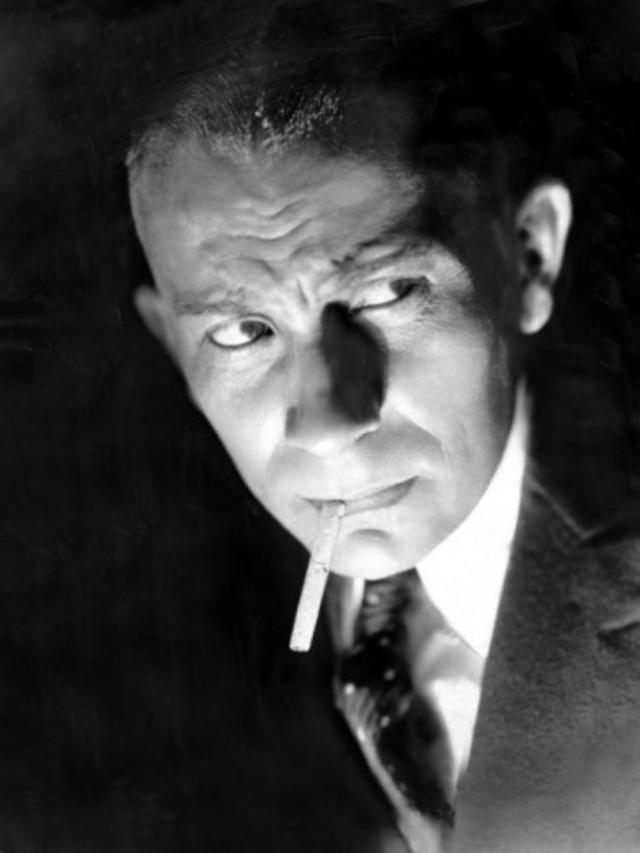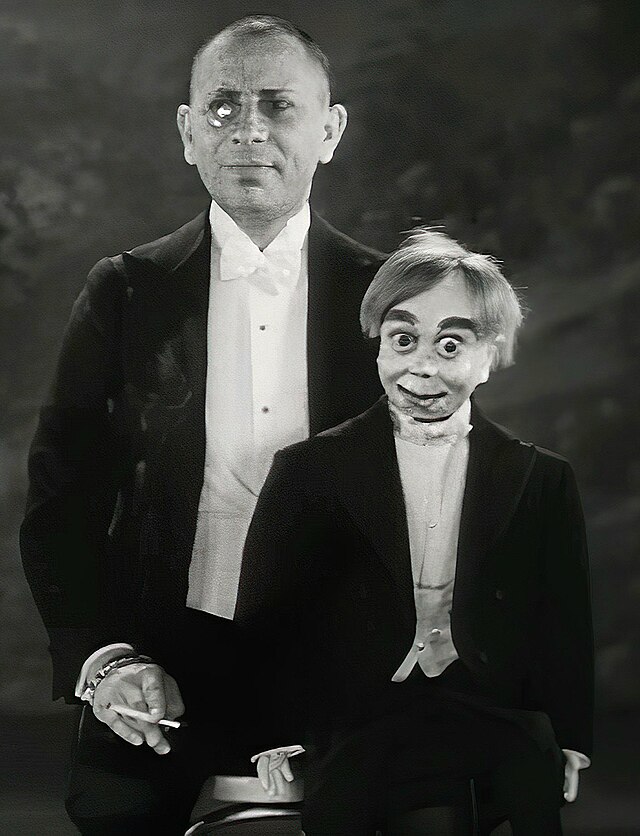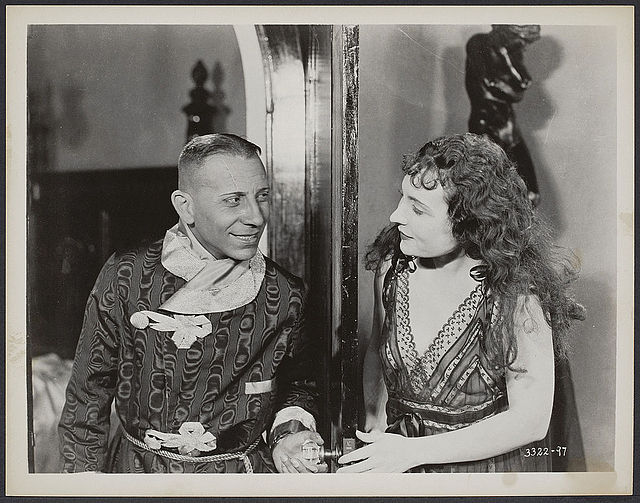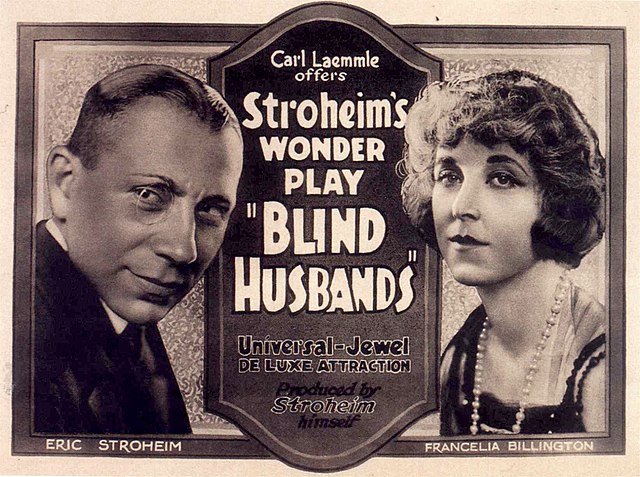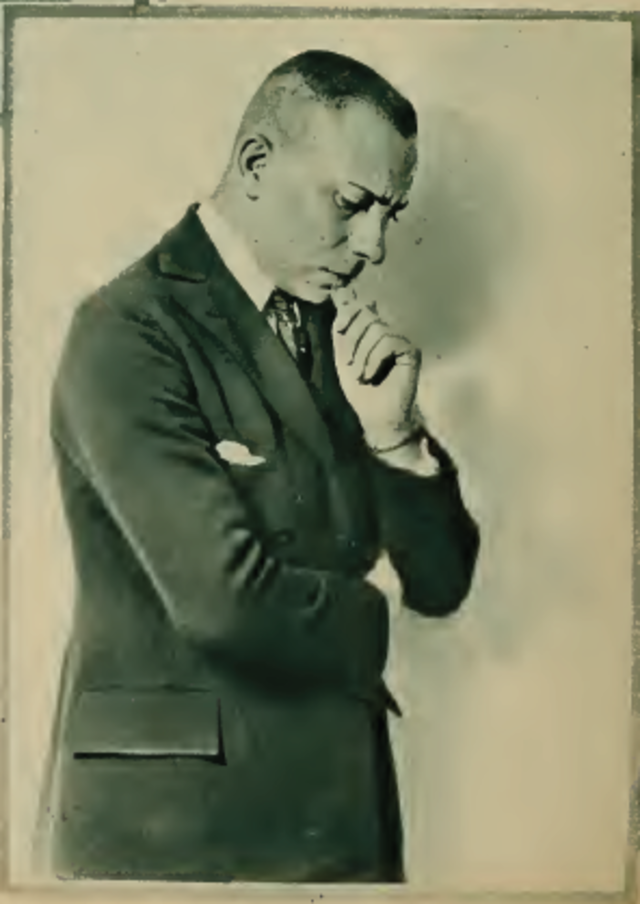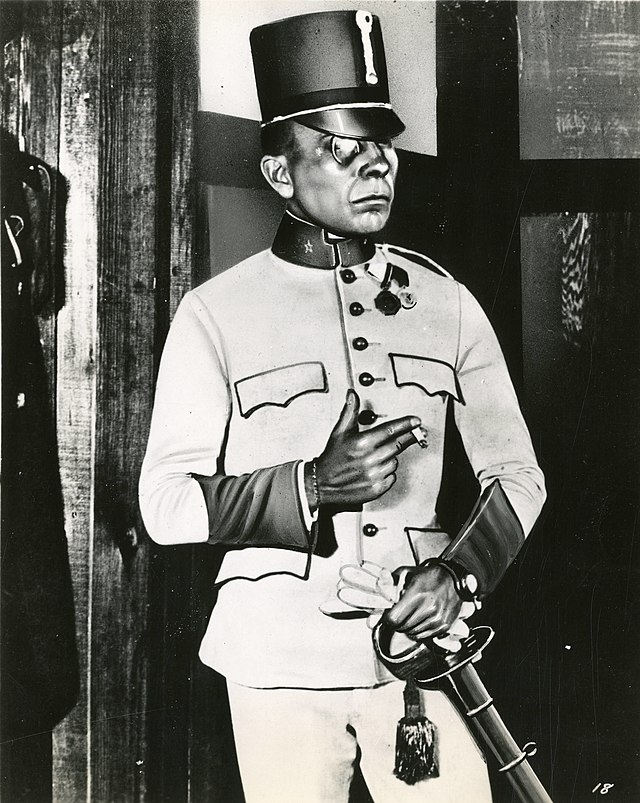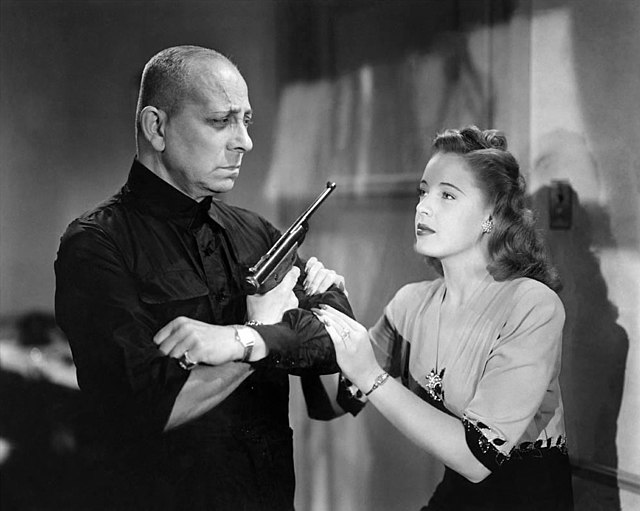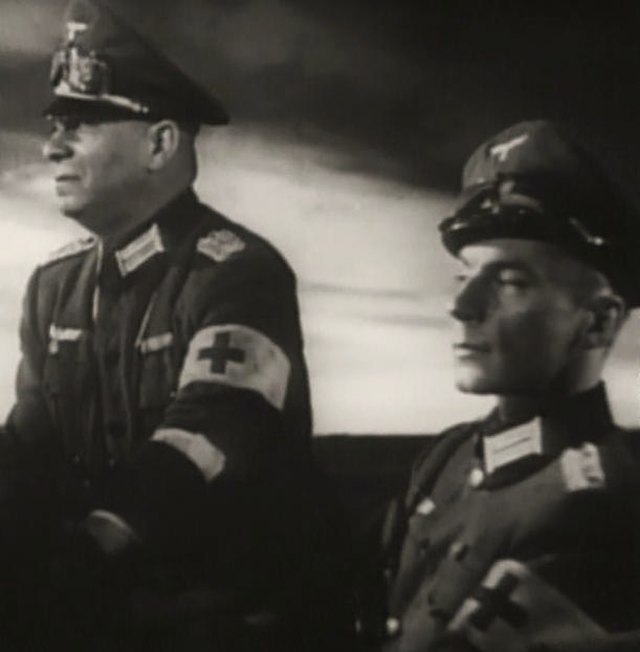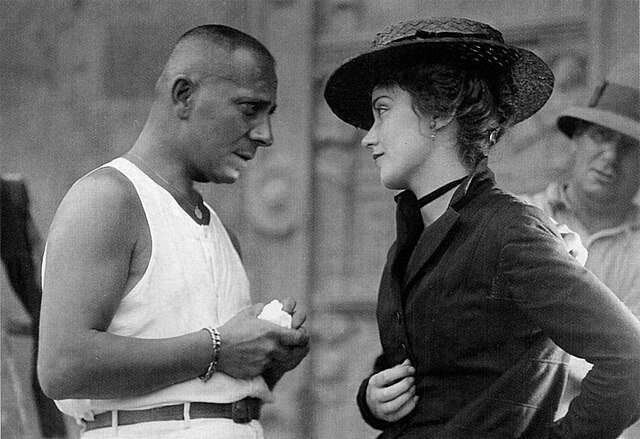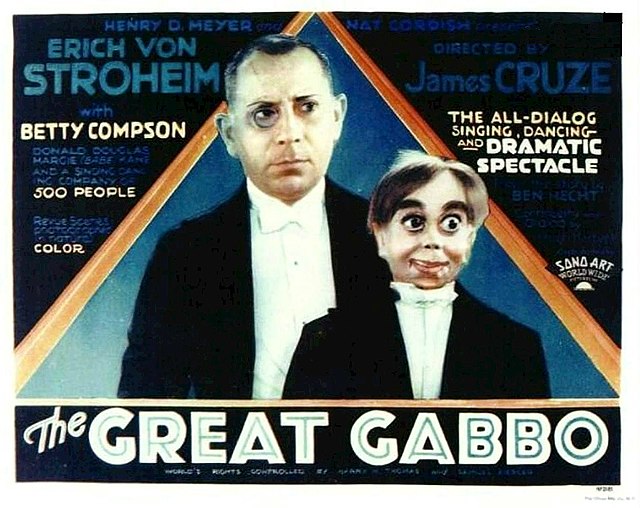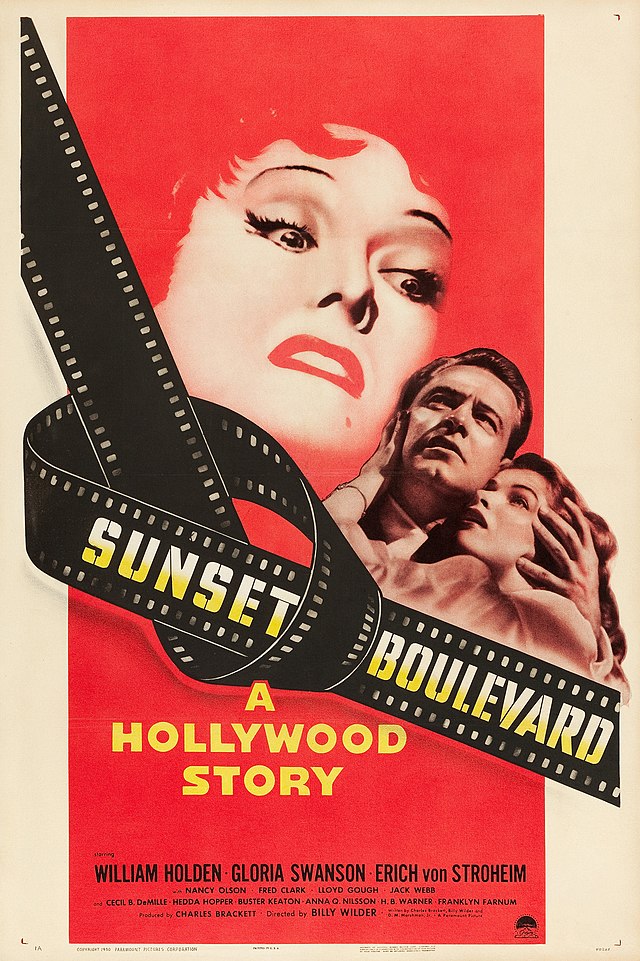Erich von Stroheim
back| Full Name | Erich Oswald Hans Carl Maria von Stroheim |
| Stage Name | Erich von Stroheim |
| Born | September 22, 1885 |
| Birthplace | Vienna, Austria-Hungary (now Austria) |
| Died | May 12, 1957 |
| Buried | Cimetière de Maurepas, Yvelines, France |
| Married to | Margaret Knox (1913–1915) - Mae Jones (1916–1919) - Valerie Germonprez (1920–1967; separated but never divorced) |
| Children | One son, Erich von Stroheim Jr. (1916–2000) |
| Notable films | Greed (1924) - The Merry Widow (1925) - Queen Kelly (1929) - Sunset Boulevard (1950) |
Erich von Stroheim
Biography and Film Career
Erich von Stroheim (1885–1957) was an Austrian-born actor and visionary director known for his intense realism and aristocratic persona. Emigrating to the U.S. around 1909, he began as a villainous character actor before turning to directing.
His silent films, like Greed (1924) and Foolish Wives (1922), were ambitious, detailed, and often clashed with studio demands. Dismissed as a director due to budget overruns and perfectionism, he reinvented himself as a character actor, earning acclaim in La Grande Illusion (1937) and Sunset Boulevard (1950), for which he received an Oscar nomination.
Known for playing stern, tragic figures, von Stroheim symbolized fallen grandeur and artistic integrity. He died in France, largely unrecognized by Hollywood but revered in Europe and by later generations.
Related
Erich von Stroheim (1885 – 1957)
The Man You Love to Hate
A Life in Command of Illusion
Erich von Stroheim was one of the most complex and fascinating figures in the history of early cinema—a man who blurred the line between life and performance, truth and fiction. Born into modest circumstances, he recast himself as nobility, a master of illusion who both created and embodied the myths of old-world aristocracy and rigid military tradition. His journey from immigrant laborer to Hollywood legend, and ultimately to exile in Europe, is a tale rich in ambition, artistry, obsession, and reinvention.
Early Life and Reinvention
Erich Oswald Hans Carl Maria Stroheim was born on September 22, 1885, in Vienna, Austria-Hungary. He was the son of Benno Stroheim, a hatmaker, and Johanna Bondy, both of Jewish descent. Despite his humble and bourgeois background, von Stroheim would later fabricate an elaborate personal history, claiming to be an Austrian count and military officer—a persona that became central to his image in Hollywood.
In 1909, he emigrated to the United States, reportedly arriving with little money and even less English. Like many new immigrants, he took on odd jobs—salesman, factory worker, and even traveling actor—until he made his way into the fledgling film industry. His sharp features, erect posture, and clipped German accent made him a natural choice for roles as the archetypal Prussian villain, particularly during and after World War I.
Path Toward Success
Von Stroheim's film career began modestly as an extra and military advisor, but his big break came when he began working under D. W. Griffith, appearing in The Birth of a Nation (1915) and Intolerance (1916). His experience with Griffith instilled in him a keen sense of visual storytelling and the possibilities of film as a grand art form.
His directorial debut came with Blind Husbands (1919), a psychological drama in which he also starred. The film’s success was immediate, praised for its psychological realism and cinematic craftsmanship. He followed it with Foolish Wives (1922), a groundbreaking film notorious for its extravagant sets and budget. Von Stroheim became known for meticulous attention to detail—insisting on real champagne, authentic uniforms, and building entire streets rather than using facades. His obsession with authenticity became both his signature and his downfall.
His magnum opus, Greed (1924), an adaptation of Frank Norris’s novel McTeague, was originally nearly ten hours long. It was a searing, uncompromising depiction of human desperation and moral decay. MGM, horrified by the film’s length and grimness, cut it down to about two hours. The original cut has been lost to history, but even the mutilated version is now regarded as a cinematic masterpiece.
Von Stroheim's later directing career was punctuated by conflict with studio executives who balked at his costly and uncompromising methods. His The Wedding March (1928) and the unfinished Queen Kelly (1929), produced by and starring Gloria Swanson, marked the end of his major directorial efforts in Hollywood.
Personal Life and Marriages
Erich von Stroheim was a complex man off-screen, just as much as he was on it. He was married three times:
- Margaret Knox (1913–1915)
- Mae Jones (1916–1919), with whom he had a son, Erich von Stroheim Jr., who would go on to have a career as an assistant director and sound editor
- Valerie Germonprez, a French-born actress and costume designer, whom he married in 1920. Though they separated in later years, they never formally divorced.
Von Stroheim’s romantic relationships were often as tumultuous as his artistic ones. Passionate, intense, and proud, he reportedly had a domineering temperament, but also a certain charm and tragic vulnerability that attracted admirers in Hollywood and Europe alike.
Artistic Passions and Persona
Perhaps more than any other figure of early Hollywood, von Stroheim was an artist enslaved to realism and the grandeur of old-world Europe. He portrayed aristocrats and tyrants, but he also yearned for something greater than wealth or fame: control. As a filmmaker, he saw himself as a conductor of reality, creating entire environments with painstaking detail, immersing actors in roles that felt lived rather than performed.
He was fascinated by decay beneath elegance—themes of lust, corruption, class, and the hollowness of aristocracy permeate his films. And in his own life, von Stroheim lived his fantasy of nobility with such fervor that many in Hollywood came to believe it was true.
His persona became inseparable from his roles. Whether as a sadistic officer in The Heart of Humanity (1918), a decadent prince in The Merry Widow (1925), or the doomed former director Max in Sunset Boulevard (1950), von Stroheim was always playing—perhaps even living—the part of a fallen monarch from a crumbling empire.
Later Years and Final Curtain
As Hollywood turned its back on him as a director, Europe embraced him anew—as both actor and symbol. Fluent in French and German, von Stroheim starred in European films throughout the 1930s and 1940s, particularly in France. Despite his declining health, he remained intellectually active and deeply involved in cinema.
His final triumph came with Billy Wilder’s Sunset Boulevard (1950), in which he played Max von Mayerling, the loyal but broken servant of a faded silent film star (played by Gloria Swanson, his real-life former collaborator). The role, rich in irony and pathos, won him an Academy Award nomination and introduced him to a new generation of filmgoers.
In the early 1950s, von Stroheim settled permanently in France, where he was better appreciated as an auteur and actor. In 1956, he was diagnosed with prostate cancer. As his health declined, he remained proud, private, and engaged in discussions about film and art.
On May 12, 1957, Erich von Stroheim died in Maurepas, France, at the age of 71. He was buried in the local Cimetière de Maurepas, far from the Hollywood that once celebrated and rejected him.
Legacy
Erich von Stroheim is remembered as one of cinema's most daring visionaries—a filmmaker and actor whose commitment to realism and psychological depth was far ahead of its time. Though many of his films were compromised or left unfinished, his impact on the art of storytelling in film remains indelible.
He was a man who invented himself, lived according to his vision, and left behind a body of work haunted by obsession, beauty, and the tragic collapse of dreams. For those who love cinema, von Stroheim is not merely a relic of the silent era—he is one of its towering figures, uncompromising to the end.
Physical Characteristics
- Height: Approximately 5 feet 8 inches (173 cm)
- Build: Slim to medium build, with a rigid, upright posture that made him appear taller and more imposing on screen
- Eyes: Grey or light blue
- Hair: Blonde in youth, later balding—often seen with a shaved or closely cropped head, enhancing his severe appearance
- Face: Sharp, angular features with high cheekbones, a pointed nose, and a narrow, expressive mouth
Distinctive Traits:
- Often seen wearing a monocle, which became a trademark
- Maintained a meticulously groomed mustache in many of his roles
- His military bearing and precise movements were part of his acting signature
Documentary on Erich von Stroheim
Erich von Stroheim: A Study in Precision, Presence, and Pathos
Erich von Stroheim was not merely an actor—he was an embodiment of persona. Every movement, every gesture, every glance seemed carefully calculated, yet never artificial. His acting style was a confluence of military rigidity, aristocratic hauteur, and deep psychological complexity. Whether playing a German officer, a tragic butler, or a broken magician, von Stroheim brought a sense of internal gravity that pulled the viewer into the troubled world behind his stern facade.
Precision and Discipline
Von Stroheim’s most visible hallmark was physical precision. Trained by his own myth of being an Austrian nobleman and military officer, he adopted a bearing of impeccable control—erect posture, clipped speech, and movement with purpose. Even when playing characters who were unraveling internally, von Stroheim’s outward poise never fully cracked, which gave his performances a unique tension.
His body language was economical but forceful: a raised eyebrow, a sudden turn, a slow approach—all imbued with meaning. He could command a scene without speaking a word, simply by presence. This made him a powerful figure on screen, especially in silent films where visual expression was paramount.
A Master of the Masked Emotion
Von Stroheim excelled at playing men of authority whose emotions simmer just beneath the surface. His characters were often figures of power—aristocrats, generals, impresarios—but they were rarely happy or whole. There was always something repressed, something aching behind the monocle and the medals. His acting invited the audience to peer behind the mask.
Rather than expressing emotion directly, von Stroheim withheld it, allowing it to build until it cracked—often in a single gesture or expression that could shift the tone of an entire scene. He had a gift for playing dignity on the edge of collapse.
Villainy Without Caricature
Though von Stroheim often played villains, especially during World War I and II propaganda films, he rarely played them as cartoons. He infused his villains with human frailty and self-awareness. Even at his most grotesque—as the sadistic officer in The Heart of Humanity—there’s a sense of tragic fallibility, of someone whose soul has been warped by structure and superiority.
He did not play evil as chaos, but as corruption within order. That made his portrayals more chilling, because they felt real—calculated, systematic, and bound to crumble.
Realism Beneath Artifice
Though his mannerisms could seem theatrical, von Stroheim was deeply invested in emotional and psychological realism. This came not from naturalism per se, but from crafting a complete and consistent inner life for every character. Even his minor roles had backstories in his mind. He believed in the total immersion of a role, which is why his performances felt inhabited rather than performed.
This was especially evident in Sunset Boulevard, where his portrayal of Max—the former director-turned-butler—was laced with autobiography and melancholy. Von Stroheim barely had to act; he simply was the man: proud, discarded, loyal, and broken by the very industry he once tried to dominate.
Expression in Silence
In the silent era, von Stroheim was a master of facial control. He could suggest entire internal monologues with a tightening of the jaw, a flicker in the eye, or a fixed stare. He understood how to work with the camera: knowing that film magnifies, he minimized—his expressions small, exact, and emotionally potent.
His acting in silence was often more powerful than dialogue-heavy performances of the sound era. He carried over this subtlety into talkies, often using silence as a form of resistance or dignity, especially when playing characters marginalized or humbled.
The Power of Persona
Perhaps more than any other early film actor, von Stroheim blended life and role into a unified screen identity. He was almost always cast as "von Stroheim": the severe, mysterious, aristocratic outsider. Rather than resist this typecasting, he leaned into it and used it as a platform to explore character depths that were unusual for the time.
His performances were shaped by a contradiction—he played superiority and humiliation at once. He was often the figure in control, yet he was also the most wounded, the most isolated. That tension gave his performances a layered richness.
Conclusion
Erich von Stroheim’s acting style was defined by discipline, depth, and duality. He was at once actor and mythmaker, aristocrat and exile, tyrant and tragic soul. On screen, he wielded control like a scalpel, never wasting a moment or a movement. Beneath his rigid exterior lived the flickering pain of someone who knew how the world devours its own.
His style may feel formal by modern standards, but it remains hauntingly powerful. Every line he spoke, every frame he occupied, carried the weight of lived experience—both his character’s, and his own.
Memorable Quotes
On Filmmaking and Art
- "In Hollywood, you're only as good as your last picture."
A cynical but accurate reflection of the studio system he struggled within. - "I am just a minor talent compared to the greats, but I know how to stage a funeral better than anyone else."
Refers to his famously grand and somber sense of drama in film. - "To call me a tyrant, as they did, is an absurdity. I was merely a perfectionist."
His self-defense against criticism of his notoriously demanding directing style. - "When you think of the garbage they give people in place of art... it makes you weep."
A reflection of his contempt for commercialism in cinema.
On Hollywood
- "Hollywood was just a cocktail party for the rich and the talentless."
A biting comment from someone who both helped shape Hollywood and was ultimately pushed out by it. - "There were no stars in my films—only characters."
Emphasizing his belief in realism and narrative over celebrity.
On His Persona and Image
- "I am not an actor. I am a phenomenon."
Half in jest, half in truth—this encapsulated his theatrical view of himself. - "I always played the swine. They liked me to be the swine."
A lament tinged with irony about his consistent casting as the villain. - "I don't need dialogue. I have a face."
Attributed to his character Max in Sunset Boulevard (1950), this line blurs with von Stroheim’s own identity and sums up the power of his screen presence.
On Life and Regret
- "Life is like a battlefield—everyone has their role, but no one survives unscarred."
A poetic, melancholic reflection often cited in biographical texts.
What Others said about Erich von Stroheim
Billy Wilder (director of Sunset Boulevard):
"He was a genius. Difficult, yes—but you can’t create anything real without being a little difficult. Stroheim knew exactly what he was doing in every frame."
Wilder cast von Stroheim in one of his most iconic late roles and admired his understanding of visual storytelling and emotional restraint.
Jean Renoir (director of La Grande Illusion):
"Von Stroheim is not only a great actor but a great soul. He brought a depth and humanity to the enemy that no French actor could have given."
Renoir, a major figure in poetic realism, deeply respected von Stroheim’s layered portrayal of the aristocratic German officer in La Grande Illusion.
Luis Buñuel (surrealist director):
"Von Stroheim was the first director who dared to be brutal and true. He didn’t fear reality. He lived it."
Buñuel saw von Stroheim as an early master of psychological and social realism, something Buñuel himself pursued through surrealism.
Gloria Swanson (actress in Queen Kelly and Sunset Boulevard):
"He was the most exacting man I ever worked with. He could drive you mad, but you knew—if you survived—you had done something worth remembering."
Swanson had a turbulent but ultimately respectful relationship with von Stroheim, whose perfectionism left a lasting impression.
Valerie Germonprez (his third wife):
"He was proud, brilliant, wounded... but behind the arrogance was a man desperately trying to make something pure in a world that rarely allowed it."
Her comments reflect a personal view of his emotional intensity and isolation.
Cinematographer William Daniels:
"Working with von Stroheim meant never knowing when you’d finish a scene. But you knew you were in the presence of someone who saw deeper than most."
Daniels, who worked with him early in his career, admired his cinematic eye even while noting his unpredictability.
Kevin Brownlow (film historian):
"He was the first true auteur. He didn't just make films—he built worlds. And they were so real the studios were terrified of them."
Brownlow championed von Stroheim in his historical works on silent cinema.
Pauline Kael (film critic):
"There was no one like him. He wore his obsessions on his sleeve—and gave us characters who were rotting in gold and lace."
Kael appreciated his unique ability to blend decadence with decay.
David Thomson (film biographer):
"Von Stroheim staged his life like one of his films: operatic, tragic, rich in delusion. And like all great actors, he made us believe."
Awards and Recognition
Academy Awards (Oscars)
- 1951 – Nominated: Best Supporting Actor
Film: Sunset Boulevard (1950)
Role: Max von Mayerling
Von Stroheim’s powerful, melancholic performance as the loyal ex-director turned butler earned him an Oscar nomination. It was his only Academy Award nomination, and it served as a late-career acknowledgment of his contribution to cinema.
Venice Film Festival
- 1938 – Special Jury Prize (Best Foreign Film)
Film: La Grande Illusion (1937)
Although the award officially went to the film, von Stroheim’s performance as the aristocratic German officer Captain von Rauffenstein was widely praised and contributed to the film’s international acclaim. The film remains a cornerstone of anti-war cinema.
French Recognition
- Legion of Honour (Chevalier) – Unofficial Recognition
While not officially recorded in every registry, von Stroheim was reportedly considered for, or informally honored by, France’s Légion d'honneur, the country's highest order of merit. His work in French cinema, especially during the 1930s and '40s, and his status as an artistic exile were highly respected in France.
Posthumous and Critical Recognition
Though he received relatively few awards during his lifetime due to his tumultuous relationship with the Hollywood system, von Stroheim has been posthumously honored in several significant ways:
- Sight & Sound Polls – His films, especially Greed, are regularly cited in critic and filmmaker polls as among the greatest ever made.
- National Film Registry (U.S.)
Greed (1924) was selected by the Library of Congress for preservation as a culturally, historically, and aesthetically significant film. - Retrospectives
Major retrospectives of von Stroheim’s work have been held by:- Cinémathèque Française
- Museum of Modern Art (MoMA)
- British Film Institute (BFI)
- Influence on Directors
Von Stroheim has been cited as an influence by many renowned directors including Jean Renoir, Billy Wilder, Orson Welles, and Stanley Kubrick.
Other Honors
- Hollywood Walk of Fame:
Erich von Stroheim has a star on the Hollywood Walk of Fame at 6821 Hollywood Boulevard, recognizing his contributions to the motion picture industry.
Erich von Stroheim Movies
1915
- Old Heidelberg – Lutz: A valet in a romantic drama about a prince who falls in love with a commoner while studying at Heidelberg University.
1916
- His Picture in the Papers – Gang Member: A satirical comedy where von Stroheim plays a gang member; the film critiques media sensationalism.
- Intolerance – Second Pharisee (Uncredited): D.W. Griffith's epic interweaving four stories of intolerance throughout history.
1917
- Sylvia of the Secret Service – Minor Role: A spy thriller where von Stroheim had a minor role and also served as assistant director.
1918
- The Heart of Humanity – Eric von Eberhard: Portrays a lecherous German officer during World War I; the film is known for its propagandistic portrayal of German brutality.
1919
- Blind Husbands – Lieutenant Eric Von Steuben: Von Stroheim's directorial debut; a drama about a woman's temptation by a charming but dangerous officer during a mountain holiday.
1920
- The Devil's Pass Key – Director: A lost film directed by von Stroheim, believed to explore themes of blackmail and moral corruption in Parisian society.
1922
- Foolish Wives – Count Wladislaw Sergius Karamzin: Von Stroheim directs and stars as a con artist posing as Russian nobility to seduce and swindle women in Monte Carlo.
1923
- Merry-Go-Round – Original Director: Initially directed by von Stroheim but completed by Rupert Julian; a romantic drama set in pre-WWI Vienna.
1924
- Greed – Balloon Vendor (Uncredited): An adaptation of Frank Norris's novel "McTeague," depicting the descent into greed and tragedy; originally over 9 hours long but heavily cut by the studio.
1925
- The Merry Widow – Director: A lavish adaptation of the operetta, focusing on a wealthy widow and her romantic entanglements with a prince.
1928
- The Wedding March – Prince Nickolas von Wildeliebe-Rauffenburg: A romantic drama about a prince torn between love and duty; von Stroheim directs and stars.
1929
- Queen Kelly – Director: An unfinished film starring Gloria Swanson as a convent girl who becomes a brothel madam; production halted due to creative differences.
- The Great Gabbo – The Great Gabbo: Von Stroheim plays a ventriloquist whose dummy seems to express his suppressed emotions; explores themes of duality and madness.
1930
- Three Faces East – Valdar / Schiller / Blecher: A spy thriller where von Stroheim plays a butler who is actually a German spy during WWI.
1931
- Friends and Lovers – Victor Sangrito: Portrays a blackmailer entangled in a romantic triangle involving British officers in India.
1932
- The Lost Squadron – Arthur von Furst: Plays a tyrannical film director exploiting stunt pilots; a satirical take on Hollywood's darker side.
1933
- Hello, Sister! – Original Director: Originally titled "Walking Down Broadway," von Stroheim's version was re-edited and released without his involvement; a drama about three women in New York.
1937
- La Grande Illusion – Captain von Rauffenstein: A German officer who forms a bond with French POWs; a poignant anti-war film directed by Jean Renoir.
1943
- Five Graves to Cairo – Field Marshal Erwin Rommel: Portrays the Desert Fox in this WWII espionage thriller directed by Billy Wilder.
1944
- The Lady and the Monster – Professor Franz Mueller: A scientist keeps a dead man's brain alive, leading to unforeseen consequences; an early sci-fi horror film.
1945
- The Great Flamarion – The Great Flamarion: A marksman entangled in a deadly love affair; a film noir exploring obsession and betrayal.
1950
- Sunset Boulevard – Max von Mayerling: An ex-director turned butler for a faded silent film star; von Stroheim's performance earned him an Academy Award nomination.
1952
- Alraune – Professor Jacob ten Brinken: A scientist creates a woman through artificial insemination, leading to tragic results; based on a German myth.
1955
- Napoléon – Ludwig van Beethoven: A cameo as the famed composer in Sacha Guitry's historical epic.
- Madonna of the Sleeping Cars – Dr. Siegfried Traurig: A German psychiatrist entangled in espionage aboard the Orient Express.

